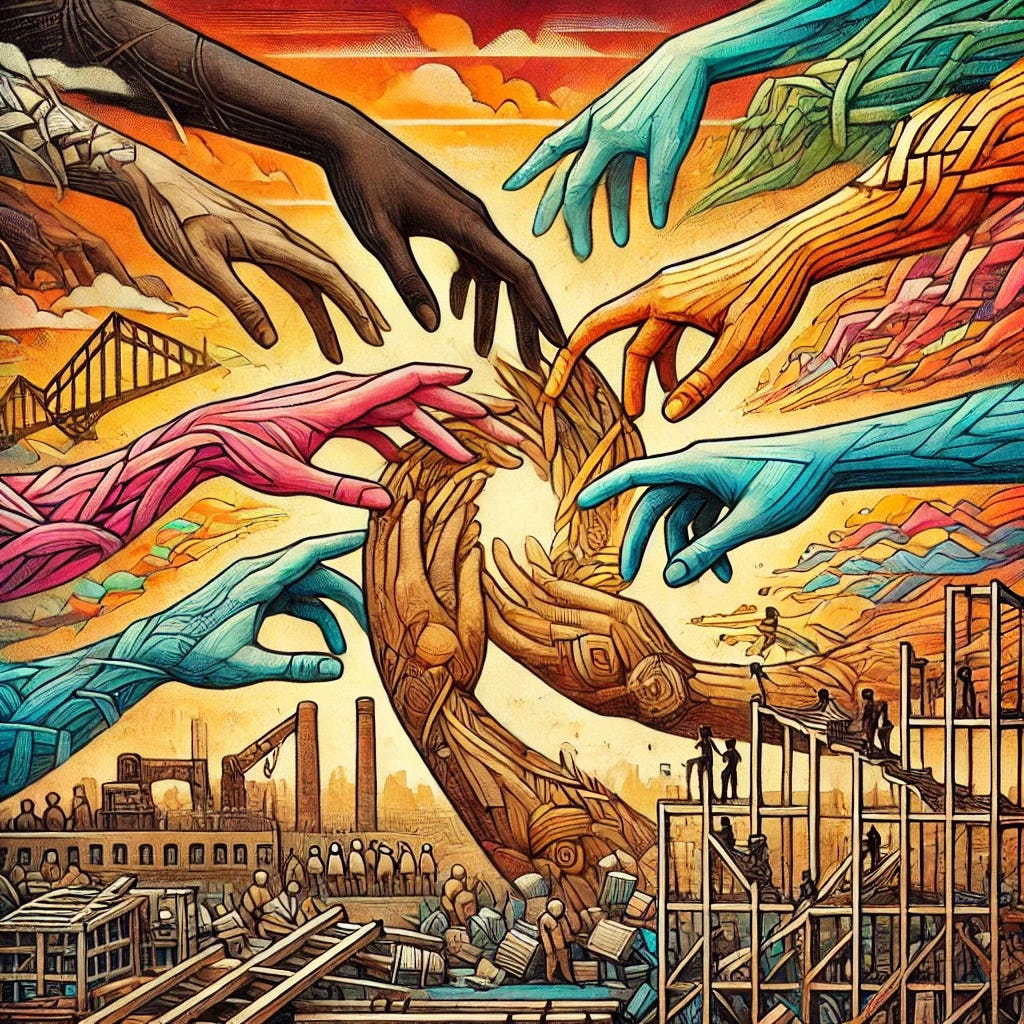The End of Allyship: Embracing Co-Creation and Collective Liberation
Moving Beyond Performance to Build a World Rooted in Love, Equity, and Justice
Introduction:
Welcome to the final article in the Allyship Series. Whether you’ve been with us from the beginning or you’re joining now, I want to thank you for showing up. This work—dismantling supremacy culture, embracing accountability, and reimagining allyship—is sacred. It’s also deeply personal, often uncomfortable, and always transformative.
Take a moment now. Pause. Breathe deeply. Drink some water. Move your body if you can. This journey requires care—care for yourself, care for others, and care for the shared work of liberation.
If this is your first step into the series, I invite you to explore the earlier articles to deepen your understanding of where we’ve been. Start with Dear White Women: This Is Where the Journey Begins, where we laid the groundwork for this journey. And if financial barriers prevent you from accessing these resources, email scholarships@desireebstephens.com. Liberation work must be accessible to all.
Today, we confront a central truth: There are no allies in liberation work. Allyship, as it has been constructed, inherently perpetuates superiority and separation. Liberation work demands something deeper—something that moves beyond individual validation and into collective transformation.
If this is your first step into the series, welcome. The concepts of power with, co-creation, and systemic accountability might feel overwhelming or even disorienting, especially if you’ve been steeped in the frameworks of allyship that focus on individual actions. That’s okay. Liberation is a journey, not a destination.
Start by asking yourself these questions:
What brought me here?
What am I willing to unlearn?
How can I begin to imagine a world beyond the systems I’ve been taught to accept as normal?
The earlier articles in this series will help you build a foundation for these reflections. From understanding the roots of “power over” to exploring introspection as a radical act, each step invites you deeper into the work of liberation. With that being said, let me say this:
There Are No “Good” White People
Take a moment. After you’ve finished clutching your pearls and feeling the sting of defensiveness rise in your chest, pause. Breathe. Let go of the need to prove you’re the “good one.” Feel the relief in releasing that weight—the performance, the striving to stand apart. Because here’s the truth: there are no “good” white people.
And that’s not an insult; it’s a systemic reality.
Liberation work isn’t about morality—it’s about systems. Supremacy culture thrives by embedding itself into the fabric of society, using your racial identity as a tool, no matter your other marginalized identities. The privileges attached to whiteness are not earned; they are conferred. This isn’t about whether you’re a kind, well-meaning person. It’s about the way the system works through you, often without your consent or awareness.
Being “good” in this context isn’t possible because the system is designed to keep you blind to its inner workings. It’s layered, insidious, and deeply entrenched. No amount of individual effort will exempt you from it. This is what systemic means.
But here’s where relief comes in: if it’s not about being “good,” then you’re free to stop performing. You don’t need to prove yourself. You don’t need to ask for validation. You don’t need to separate yourself from “those other white people.” Instead, you can focus on the work of dismantling the system and reclaiming your full humanity—work that is deeply relational, collective, and liberatory.
This isn’t about individual blame or shame; it’s about stepping into accountability. When you stop trying to be the “good one,” you can begin to show up as a co-creator—a person willing to confront the system and build something new alongside others.
Reflection:
How has the need to be seen as “good” shown up in your allyship journey?
What would it look like to let go of that need and focus on transformation instead?
The Limits of Allyship
Allyship, as it is often practiced, centers the individual. It asks white-bodied people to position themselves as helpers or saviors, creating a dynamic that reinforces the very hierarchies liberation work seeks to dismantle. This framework:
Reinforces Superiority: By defining allyship as “helping,” it positions marginalized communities as powerless and white allies as benevolent actors.
Centers White Comfort: Many allyship practices prioritize being seen as “good” or avoiding discomfort, rather than addressing systemic harm.
Individualizes Liberation: Allyship often focuses on individual actions rather than collective accountability, neglecting the systemic nature of oppression.
When allyship is tied to validation, it becomes performative, fleeting, and shallow. To truly engage in liberation work, we must move from allyship to co-creation.
Co-Creation: A New Foundation for Liberation
Co-creation is the antithesis of allyship. It shifts the focus from individual actions to shared accountability and mutual liberation. It invites white-bodied people to see themselves not as saviors, but as interconnected beings with a shared stake in dismantling systems of harm.
What Co-Creation Offers:
A Shared Investment in Liberation: Co-creation recognizes that the systems of supremacy culture harm everyone, albeit in different ways. It centers collective transformation over individual morality.
What Subscribers Receive:
Exclusive access to the full Allyship Series and future articles.
Practical tools and insights to guide your liberation journey.
Invitations to workshops and live sessions for deeper engagement.
The opportunity to sustain equity by keeping this work accessible to all.
Equity Statement:
If financial barriers prevent you from subscribing, email scholarships@desireebstephens.com to request access. Liberation work must remain accessible to everyone




